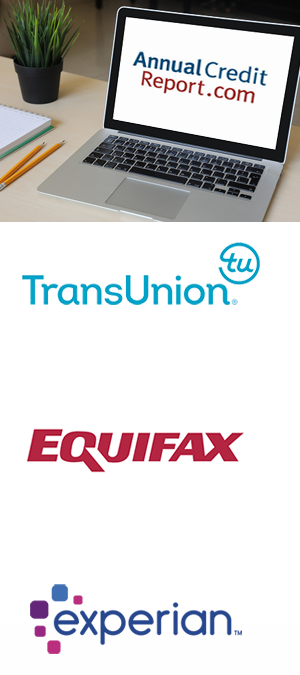With identity thieves continuing to target the tax community, the IRS is urging you to learn the new signs of identity theft so you can react quickly to limit any damage.
The common signs of ID theft
Here are some of the common signs of identity theft according to the IRS:
- In early 2022, you receive a refund before filing your 2021 tax return.
- You receive a tax transcript you didn’t request from the IRS.
- A notice that someone created an IRS online account without your consent.
- You find out that more than one tax return was filed using your Social Security Number.
- You receive tax documents from an employer you do not know.
Other signs of identity theft include:
- Unexplained withdrawals on bank statements.
- Mysterious credit card charges.
- Your credit report shows accounts you didn’t open.
- You are billed for services you didn’t use or receive calls about phantom debts.
What you can do
If you discover that you’re a victim of identity theft, consider taking the following action:
- Notify creditors and banks. Most credit card companies offer protections to cardholders affected by ID theft. Generally, you can avoid liability for unauthorized charges exceeding $50. But if your ATM or debit card is stolen, report the theft immediately to avoid dire consequences.
- Place a fraud alert on your credit report. To avoid long-lasting impact, contact any one of the three major credit reporting agencies—Equifax, Experian or TransUnion—to request a fraud alert. This covers all three of your credit files.
- Report the theft to the Federal Trade Commission (FTC). Visit identitytheft.gov or call 877-438-4338. The FTC will provide a recovery plan and offer updates if you set up an account on the website.
- Contact your CPA, tax preparer or financial advisor if you suspect any tax-related identity theft. If any of the previously mentioned signs of tax-related identity theft have happened to you, please call to make an appointment to discuss what further steps you can take.
 The IRS recently announced its 2020 edition of its annual Dirty Dozen list of tax scams with a special emphasis on aggressive and evolving schemes related to COVID-19 tax relief, including Economic Impact Payments. Here are six of the more common scams.
The IRS recently announced its 2020 edition of its annual Dirty Dozen list of tax scams with a special emphasis on aggressive and evolving schemes related to COVID-19 tax relief, including Economic Impact Payments. Here are six of the more common scams.
Phishing. Phishing refers to potential fake emails or websites looking to steal your personal information. Remember the IRS will never initiate contact with you via email about an outstanding tax bill, refund or Economic Impact Payment.
What you can do. If you receive any suspicious phishing emails, forward them to phishing@irs.gov.
Fake charities. Criminals frequently exploit natural disasters and other crisis situations such as this year’s pandemic by setting up fake charities to steal donations. Fraudulent schemes normally start with unsolicited contact by telephone, text, social media, e-mail or even in person.
What you can do. Verify the charity’s existence by searching for it using the IRS’s search tool.
Threatening phone calls from IRS impersonators. IRS impersonation scams include phone calls threatening arrest, deportation or license revocation if you don’t pay a bogus tax bill. The IRS will never demand immediate payment or ask for financial information over the phone.
What you can do. If you received a phone call, contact your local IRS office to verify whether you owe any taxes.
Social media scams. A scammer will use social media platforms such as Facebook and Twitter to obtain personal information from you, then use that information to trick you into providing them with confidential information. For example, the scammer could impersonate a family member, friend or co-worker in an attempt to obtain financial information.
What you can do. Be careful of publishing confidential information on social media. Verify the identity of any person or organization that asks you for confidential information.
Economic impact payment or tax refund theft. Criminals file false tax returns or supply other bogus information to the IRS to divert refunds or Economic Impact Payments to wrong addresses or bank accounts.
What you can do. Contact a qualified professional to help walk you through how to report identity theft to the IRS.
Senior fraud. Senior citizens have become more comfortable with various technologies such as social media. This has opened the door for scammers to take advantage of senior citizens by using fake emails, text messages and fake websites to steal personal information.
What you can do. Be the eyes and ears for the senior citizens you come in contact with. According to the IRS, anecdotal evidence indicates that senior fraud decreases substantially when a trusted friend or family member takes an interest in the senior’s affairs.
 One way to head off fraud during tax season is to get your free annual credit report now. Credit reports often have errors in them; this quick checkup can be the first indication that some form of identity theft has taken place on your account.
One way to head off fraud during tax season is to get your free annual credit report now. Credit reports often have errors in them; this quick checkup can be the first indication that some form of identity theft has taken place on your account.
The good news is that each of the major consumer credit reporting agencies is required by law to provide you with a free report once a year. Here’s contact information to help you get your free credit report:
Telephone: 1-877-322-8228
Website: www.AnnualCreditReport.com
Via mail: (fill out the online form and mail it to the following address)
Annual Credit Report Request Service
P.O. Box 105281
Atlanta, GA 30348-5281
Listed here are the three major credit agencies and how to contact them directly.
TransUnion
Telephone: 833-395-6938
Web site: www.transunion.com
Via mail: 2 Baldwin Place
P.O. Box 2000
Chester, PA 19022
Equifax
Telephone: 1-800-685-1111
Web site: www.equifax.com
Via mail: Equifax Credit Information Service
P.O. Box 740241
Atlanta, GA 30374-0241
Experian
Telephone: 1.888.EXPERIAN (397-3742)
Web site: www.experian.com
Via mail: P.O. Box 9701
Allen, TX 75013
Reminder: Each agency may try to upsell you into additional paid services. If you find problems on your credit report, work through the credit bureau’s process to correct the error. Also place fraud alerts on your credit agency account if you experience any kind of identity fraud.
 According to the Association of Certified Fraud Examiners, nearly 30 percent of businesses are victims of payroll malfeasance, with small businesses twice as likely to be affected as large businesses. Here are four scary payroll fraud schemes you need to know:
According to the Association of Certified Fraud Examiners, nearly 30 percent of businesses are victims of payroll malfeasance, with small businesses twice as likely to be affected as large businesses. Here are four scary payroll fraud schemes you need to know:
- Ghost employees. A ghost employee does not exist anywhere except in your payroll system. Typically, someone with access to your payroll creates a fake employee and assigns direct deposit information to a dummy account so they can secretly transfer the money into their own bank account.
- Time thieves. Time stealing happens when employees add more time to their timecard than they actually worked. Sometimes multiple employees will team up to clock each other in earlier than when they arrive or later than when they depart for the day.
- Shape-shifting commissions. In an attempt to bump up a commission payment or attain a quota, sneaky sales employees may alter a sales contract to their benefit. A typical tactic used by a dishonest salesperson is to make a booked sale appear larger than it is and then slide a credit memo through the system in a later period. Companies with complicated commission calculations or weak controls in this area are the most vulnerable.
- External swindlers. A popular scam, known as phishing, starts with a fraudster impersonating a company executive through email or over the phone asking an employee with access to payroll data to wire money or provide sensitive information. These imposters can make the correspondence look very real by using company logos, signatures and email addresses.
Tips to combat payroll fraud
Being aware of the threats is a start, but you also need to know how to stop them. Here are some tips to reduce your company’s payroll fraud risk:
- Better internal controls. While most employees are trustworthy, giving too much control over your payroll to one person is not a good idea. Separating payroll duties and formalizing an approval process protects both your business and your employees.
- Review payroll records. Designate someone outside of the payroll-processing department to periodically review the payroll records. Have them review names, pay rates and verify that the total payroll matches what was withdrawn from the business bank account.
- Perform random internal audits. During an internal audit is when you can really get into the details to look for potential payroll fraud. You can do an in-depth review of the whole payroll system or select a random sample of dates and employees. Keep the timing of the audit under wraps to prevent giving someone the chance to cover up their misdeeds.
Managing your business payroll is a daunting task by itself, and actively protecting against fraud adds additional complexity.
Identity theft is a growing problem in the United States, and dozens of companies offering various forms of identity theft protection have sprung up to combat it. Unfortunately, these services often do little to actually protect people’s identities, according to a study released by the U.S. Government Accountability Office (GAO).
Both the GAO study and consumer protection organizations like The Identity Theft Council point out that consumers have more effective, low-cost methods to protect themselves from identity theft. Here are some of their tips:
Monitor your own credit. You can get a free credit report from each of the three credit reporting agencies once a year at www.annualcreditreport.com. You can stagger your request from each agency so that you can check your credit history for any suspicious new account openings every four months.
In addition, one of the most effective things only you can do yourself is to scan your monthly credit card and bank account statements. If you see any irregularities, contact the financial institution at once and let them know if you believe any charges are the result of identity theft.
Place a fraud alert. You can place a free fraud alert on your identity if you believe you’ve become vulnerable for any reason, either because you lost your wallet, had your home or car broken into, or had your information stolen online. All you have to do is call any of the three credit reporting agencies (Equifax 1-888-766-0008; Experian 1-888-397-3742; or TransUnion 1-800-680-7289) and they will notify the other two.
Placing a fraud alert lasts for 90 days. Any credit provider will have to take extra steps to verify the identity of any person who tries to use your credit and open new accounts. It can be renewed for free every 90 days.
Freeze your credit. If you aren’t going to be applying for new credit for a while, one of the most effective things you can do to combat identity theft is to put a temporary freeze on your credit. You’ll have to call each of the three credit reporting agencies and may be required to pay a small fee ($5 to $10 each) to freeze your account, after which no one will be able to access your credit to open new accounts. It won’t affect your credit rating or your ability to use your existing accounts.
Keep in mind that while this shuts down other people from accessing your credit, it also stops you from opening new accounts. It typically takes three days for the agencies to unfreeze your accounts, so keep that in mind if you want to apply for new credit, or need to allow a potential new employer to access your credit report as part of a background check.
Do your taxes early. One of the most common kinds of identity theft is when people use a stolen Social Security number and other personal information to file a fraudulent tax return in the hope of snatching a refund. Your best defense is to simply file your return as soon as possible. Once the IRS receives your return, it shuts the door on potential identity thieves.
Last week we told you about the three largest of the “Dirty Dozen Tax Scams”. This week we will cover the rest.
Return preparer fraud – In conjunction with Identity Theft, many temporary tax preparation offices set up shop and generate fraudulent tax returns. These folks often file a return using stolen information, create refund fraud and other scams that leave you holding the tax obligation when caught.
Offshore accounts – The IRS has taken many enforcement actions in this area after breaking the long-standing secrecy wall of Swiss bank accounts. If you have money in foreign accounts, you must understand the reporting requirements or you could be subject to substantial fines.
Fake charities – After major disasters, many charitable givers are scammed into making donations to fake charities. In addition, new IRS charitable organization reporting requirements are not being followed by many organizations. This makes donations to them non-deductible. To protect against this, make sure the charity is both legitimate and deemed a qualified charity by the IRS before you donate.
Other scams – The other six scams that round out the IRS list include: inflated refund claims, falsely padding deductions, excessive business credit claims, falsifying income to claim credits, abusive tax shelters, and frivolous tax arguments.
If you want more info, visit the IRS website at www.irs.gov and click on the News & Events tab/Tax Scams!
Each year the IRS announces “Dirty Dozen Tax Scams” they encounter regarding frivolous tax arguments and fraud. While six of the “scams” are related to, “don’t cheat we have our eyes on you,” the other six are scams that all of us should be on guard to detect. Here are the largest three scams:
Identity theft – Identity theft tops the list of the dirty dozen this year. This reflects a truly bad year for the IRS. The IRS has acknowledged the theft of taxpayer’s private information three times in the past eighteen months. Thankfully, the IRS is taking precautionary measures to curtail this huge problem. For example, they are limiting the number of direct deposits it will make to any single account, working with states and tax preparation software vendors to put more controls in place, delaying the early processing of tax refunds, internal tracking within software programs, and continual checking for heavy filing activity. Some states will even be requiring driver’s license numbers on their tax forms. For people who have already had identity problems, there are taxpayer single use tax ID’s that change every year. If you wish to know more, here is a link to the IRS identity protection page: IRS Identity Protection: Prevention, Detection and Victim Assistance
Phone scams – Phone calls from thieves representing themselves as IRS agents continue to get more sophisticated. These thieves often have some personal information, the caller ID may show as coming from the IRS and the scam may involve numerous phone calls instead of a single contact. Some are even automated phone calls! Threats range from arrest warrants to deportation to law suits. Remember, never give information over the phone to someone claiming to be from the IRS when they call.
Phishing – This recurring scam involves receiving fake emails and creating websites that look like the real deal. The IRS will not send you billing information or refund information via email. Do not click on any link from an email received from the IRS unless you requested it. Remember the IRS does not initiate contact through emails.
Look for the second part of this article next week for more info!
The Internal Revenue Service issued a consumer alert about possible fake charity scams emerging due to the mass-shooting in Orlando, Florida, and encouraged taxpayers to seek out recognized charitable groups.
When making donations to assist victims of this terrible tragedy, there are simple steps taxpayers can take to ensure their hard-earned money goes to legitimate charities. IRS.gov has the tools taxpayers need to quickly and easily check out the status of charitable organizations.
While there has been an enormous wave of support across the country for the victims and families of Orlando, it is common for scam artists to take advantage of this generosity by impersonating charities to get money or private information from well-meaning taxpayers. Such fraudulent schemes may involve contact by telephone, social media, email or in-person solicitations.
The IRS cautions donors to follow these tips:
- Be sure to donate to recognized charities.
- Be wary of charities with names that are similar to familiar or nationally known organizations. Some phony charities use names or websites that sound or look like those of respected, legitimate organizations. The IRS website at IRS.gov has a search feature, Exempt Organizations Select Check, through which people may find qualified charities; donations to these charities may be tax-deductible.
- Don’t give out personal financial information — such as Social Security numbers or credit card and bank account numbers and passwords — to anyone who solicits a contribution. Scam artists may use this information to steal a donor’s identity and money.
- Don’t give or send cash. For security and tax record purposes, contribute by check or credit card or another way that provides documentation of the gift.
- Consult IRS Publication 526, Charitable Contributions, available on IRS.gov. This free booklet describes the tax rules that apply to making tax-deductible donations. Among other things, it also provides complete details on what records to keep.
Taxpayers suspecting fraud by email should visit IRS.gov and search for the keywords “Report Phishing.”
More information about tax scams and schemes may be found at IRS.gov using the keywords “scams and schemes.”
Imagine this – you’ve given us all your documents early, we’ve prepped and processed your tax return, you’ve reviewed it and signed the eFile forms… then we call you and advise you that your tax return rejected eFiling because someone has already filed using your social security number! Sadly, this can happen if you become one of the growing number of victims of tax return identity theft. At least one estimate shows tax-related identity theft cases have increased 650% since 2008. Identity theft can delay your tax refund, but other consequences could be credit card debt or loans taken out in your name.
To avoid becoming a victim, we recommend the following:
- Safeguard your social security number and other financial information. Don’t send financial documents via email unless you use an encryption program. To send documents to us, use our LeapFile application to securely send us documentation.
- Check your bank and credit card transactions regularly and monitor your credit ratings.
- Don’t give out your information on the phone, even if the caller identifies themselves as an agent of the IRS or other authorities.
Identity theft and fraud are at an all-time high – you know it and we’ve told you about it. We recommend that you check your credit reports at least once a year. Credit reports often have errors in them and this quick checkup can be the first indication that some form of identity theft or fraud has taken place on your account. Review the information to ensure its accuracy.
The three major credit card reporting agencies – Experian, Equifax and TransUnion – are required by law to provide you with a free report once a year. A website has been set up specifically for this purpose:
Website: www.AnnualCreditReport.com
Telephone: 1-877-322-8228
Via Mail: Fill out the online form and mail it to:
Annual Credit Report Request Service
PO Box 105281
Atlanta, GA 30348-5281